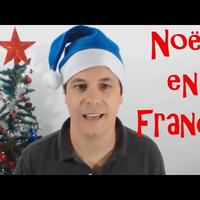les Fêtes de fin d'Année !
Bonjour ! Alors comme promis, je vais vous expliquer
comment se passent les fêtes de fin d'année en France !
Et en plus, pour ce podcast, j'ai écrit tout le texte. Vous trouverez la transcription
sur le blog, je vous laisse le lien sous la vidéo !
On va commencer par Noël. Donc, le 24 décembre, on fait un dîner spécial qu'on appelle
le réveillon de Noël. C'est généralement en famille mais on peut aussi inviter des
amis proches. Alors les catholiques, eux, vont à la messe
avant le dîner. On appelle souvent cette messe, la messe de Minuit car avant, c'était
traditionnellement à minuit mais maintenant ce n'est plus le cas, c'est plutôt vers
8 heures ou 9 heures du soir. Alors donc, pour le réveillon, on mange plein
de bonnes choses comme du foie gras, des huîtres, du saumon fumé, etc. Mais le plat typique,
c'est la dinde aux marrons. Alors la dinde, c'est comme un gros poulet et on la fourre avec des marrons. Marrons ou
châtaignes si tu préfères. Mais ça ne veut pas dire qu'on mange toujours de la
dinde, c'est possible mais pas obligatoire ! Moi, par exemple, je n'ai jamais mangé
de dinde à Noël ! Pour dessert, le dessert traditionnel c'est
la bûche de Noël c'est un gâteau avec du chocolat qui a la forme d'une bûche
c'est-à-dire les morceaux de bois cylindriques que l'on met dans la cheminée pour faire
du feu. Mais, encore une fois, ce n'est pas obligatoire
et on peut manger un autre dessert. Le tout c'est que ce soit bon !
Alors, on accompagne le repas généralement de bons vins ! Sur le foie gras, le meilleur
c'est sans doute le Sauternes même c'est un peu cher ; c'est un vin blanc sucré.
Et puis pour l'apéritif, on boit du champagne comme dans tous les grands événements en
France. On boit aussi du vin rouge comme du Bordeaux.
Alors dans la nuit du 24 au 25 décembre, passe le père Noël pour apporter les cadeaux !
Il passe par la cheminée (pour ceux qui ont une cheminée !) et il dépose les cadeaux
au pied du sapin. Donc, ça c'est le sapin. Le sapin c'est l'arbre que l'on décore
pour Noël. On le décore avec des boules et des guirlandes. Ah ! C'est tombé ! Alors…
des guirlandes donc, voilà, ça c'est une guirlande et… des boules, voilà, alors
ça c'est… les boules, d'accord ? Et voilà, ou une boule, d'accord ? Donc des
guirlandes, la guirlande et la boule. Bien ! Alors…
Et d'ailleurs, on fait aussi la crèche, alors je n'ai pas de crèche, c'est-à-dire
la reproduction de la naissance de Jésus avec le “petit Jésus”, Marie, Joseph,
l'âne et le bœuf, les Rois mages, etc. Je vais essayer de remettre quand même le
sapin… Voilà ! ( La guirlande marche plus ! )
Bon bref, le père Noël dépose les cadeaux au pied du sapin et à côté des chaussures
de chacun pour savoir quel cadeau est pour qui ! Eh Eh ! pas bête le père Noël, hein ?!
Et le lendemain matin, c'est un des plus
beaux moments de l'année pour les enfants puisqu'ils découvrent et ouvrent comme
des fous tous les cadeaux ! Donc le 25, c'est férié, c'est-à-dire
que les gens ne travaillent pas et souvent, on déjeune avec l'autre famille, c'est-à-dire
chez votre belle-famille : du côté de votre femme ou de votre mari ou chez la sœur ou
le frère de votre père ou de votre mère : chez votre tante, chez votre oncle et donc
c'est un autre repas de famille. Bon, voilà en gros ! Donc c'est une période
où on mage bien, on mange du chocolat, des gâteaux, plein de bonnes choses qui font
grossir, très mauvaises pour le régime ! Alors on chante aussi certains chants typiques
comme “Douce nuit” ou “Vive le vent” mais pas autant que dans d'autres pays,
comme en Espagne où c'est très typique de chanter les chants de Noël.
Et à propos, une autre différence avec l'Espagne, c'est que l'on ne fête pas vraiment les
Rois, les Rois mages, donc les cadeaux, chez nous, c'est seulement le papa Noël qui
les apporte. Alors une semaine plus tard, pour fêter la
nouvelle année, on remet ça ! Mais c'est un peu différent, on fait un dîner qui s'appelle
le réveillon de la Saint-Sylvestre ou réveillon du nouvel An. Mais c'est une fête moins
“famille” et plus entre amis. Souvent les gens font des soirées chez eux et si
on a de la chance et des amis, il est probable qu'on soit invité à une soirée chez des
amis. On peut aussi sortir dehors, il y a généralement un feu d'artifice à minuit.
On boit du champagne et à minuit, on s'embrasse pour fêter le nouvel an. Traditionnellement,
on s'embrassait sous le gui, c'est une plante avec laquelle on décore la maison
à l'époque de Noël. Donc, voilà le premier de l'an est plus
“copains”, plus fête pour s'amuser entre amis.
Alors pour Noël, on dit “Joyeux Noël !” ou même “Bon Noël !” et pour la nouvelle
année, on dit “Bonne année !”. Alors moi, je vous souhaite d'avoir une
super année 2015, que tous vos vœux se réalisent et que vous appreniez plein de français !
Si ce n'est pas encore le cas, n'oubliez pas de me suivre sur Facebook et de vous abonner
à ma chaîne You Tube. Je vous embrasse !

